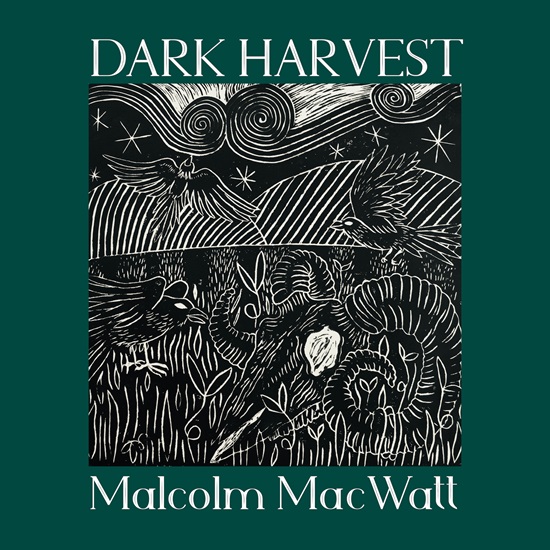
Spoiler alert; this is a cracking album. We haven’t reached the end of January yet and we’ve got the first five-star album. Malcolm MacWatt, with a few guest artists, has created a rounded and inspired piece of work that links Scottish and American music, historical and contemporary themes and political ideas spanning generations and centuries. Not only has Malcolm fused all of these ingredients to create a melodic and very thought-provoking album, he’s also tapped in to my own heritage as a Scottish expat who’s spent decades living in England while hanging on to those Celtic roots. It’s a powerful thing when an artist’s work hits you on musical and lyrical levels, even more so when it hits you on a personal level.
Malcolm’s upbringing as mixed-race Scottish in the Highlands followed by a spell working offshore in the oil industry. That kind of background, combined with a radical and inquiring spirit has led to some strong environmental, republican (not in the American sense) and nationalist (not in the jingoist Little England sense) views that permeate the album.
The opening two songs, the ‘Nebraska’-tinged ‘Strong is the North Wind’ and the triple-time ‘The Church and the Crown’ set the political tone for the album; the first is an exhortation to use the hard-earned right to vote, while the second criticises the power wielded by church and crown to subdue the masses and mentions historical figures Wat Tyler and John Ball. The songs ‘She Told Me Not to Go’ and ‘Heather and Honey’ both draw strong historical parallels with events that happened around two hundred years ago, the first linking the exploitation of nature and the environmental damage caused by factory whaling with similar problems caused by offshore oil drilling today. The second draws a straight line between The Highland Clearances and the slightly softer but still corrosive current approach of converting estates into playgrounds and hunting grounds for the rich and famous while forcing workers off the land and into the cities.
The title song with its traditional folk backing and spoken vocal tells another story of imperialism involving the wartime use of the Scottish island Gruinard as a testing site for anthrax as a chemical weapon before condemning it, supposedly forever a contaminated island before the Dark Harvest commandos intervened to bring the issue into the spotlight and force a clear-up.
And beyond this selection, the great songs keep coming. The highly personal and autobiographical ‘Empire in Me’ and ‘Semi-Scotsman’ and the stories of Scots helping to build the young America (‘Out on the Western Plain’ and ‘Buffalo Thunder’). Fourteen songs and every one a little classic from a gifted songwriter and multi-instrumentalist. It’s political, but Malcolm’s absolutely right in identifying current and historical injustice and placing it in the spotlight. You really need to listen to ‘Dark Harvest’; it’s packed with powerful melodies, great playing and lovely harmonies that all serve as vehicles for some disturbing truths.
‘Dark Harvest’ is out now on Need to Know Music (NTKBBV2024MM).
Here’s the video for the title track:
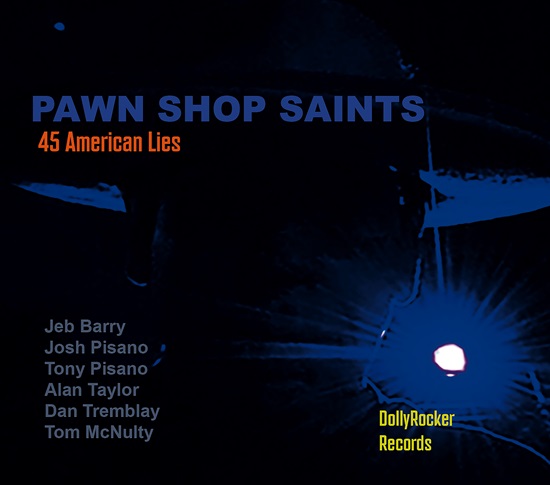
I may have mentioned that I love a challenge, but here’s one that I wasn’t expecting. I’ve never reviewed a triple album (bought a few in the vinyl era). Before The Clash released ‘Sandinista!’, the triple album was mainly a prog phenomenon with bands like Yes and Emerson, Lake and Palmer using the format for extended instrumental workouts. The Clash brought it all back to basics with a classic six songs per side over six sides. Jeb Barry’s Pawn Shop Saints have taken the Clash’s value for money concept even further with fifteen tracks per album – the maths is easy, it’s forty-five songs. Sensibly enough, it’s a digital-only release to download or stream.
The project started just after 2023’s ‘Weeds’ album was completed and pulls together songs that were written over a period of twenty years or so. ’45 American Lies’ is a bit of a tidy-up operation; you have a stack of forty-five songs that you’ve gathered over the years that didn’t quite fit in on any previous albums but you think they have value so why not record them and get them all out there at the same time. The recording process was all about getting the songs recorded with a maximum of speed and a minimum of studio trickery. There’s a lot of material here and the common factors are Jeb Barry’s classic songwriting and his high lonesome voice. He’s not expecting everyone to like every song on the album (do you know anyone who likes every song on ‘Sandinista!’?), but he’s quite happy if you dip in and find a couple that you like from the smorgasbord on offer.
For what it’s worth, my favourites after a couple of listens (and that could easily change after another listen) are ‘Liverpool’, a story of everyday male sexual jealousy, ‘Cottonwood’ and ‘Repo Man’ on the familiar Jeb Barry theme of the destruction of rural communities and ‘Heading to Parchman’, the story of a doomed relationship that culminates in twenty to life in Mississippi State Penitentiary, which has a rich history in popular song, including Hannah Aldridge’s 2014 classic, ‘Parchman’.
It’s a bit of a long shift listening to the whole piece, but if you like quality Americana, then you’ll find something for you in this collection.
’45 American Lies’ is out now on Dollyrocker Records.
Here’s an acoustic video of ‘Cottonwood’:
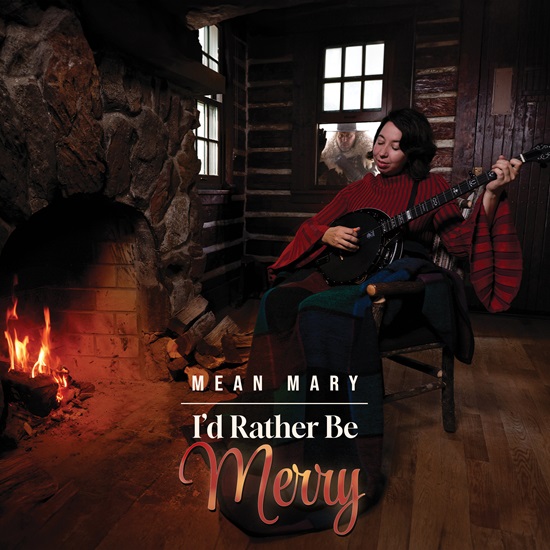
I suspect this is the only Christmas album we’ll be reviewing this year so I’m happy to say that it’s an interesting and varied piece of work. ‘I’d Rather be Merry’ is Mean Mary’s nineteenth album and it applies her usual talents of banjo picking, pure and clean vocals, and a certain amount of songwriting, to a Christmas theme. As always, it’s a combined effort with her brother Frank and brings a certain amount of humour associated with the brother/sister dynamic as well as superb musicianship.
The album is an interesting combination of traditional Christmas carol settings with contemporary elements and a bit of bluegrass thrown in for good measure. ‘I Saw Three Ships’, which opens the album, has a jaunty, contemporary feel with Mary’s trademark clean enunciation, lovely harmonies and the almost obligatory banjo solo, while ‘Jingle Bells’ starts as a traditional carol before a fiddle solo morphs it into a bluegrass setting. The interpretations of the Christmas standards are varied and interesting and enjoyable listening, but it’s the originals that really create the mood of the album with Mary’s characteristic humour and humanity. There are two humorous songs and the album’s closer ‘Ding Dong Day’ which we’ll get to shortly.
‘Cardboard Box’ is a fairly typical humorous Mean Mary song with a Christmas theme involving accidental violence against a partner while ‘I’d Rather Be Merry’ features verbal sparring and wordplay around the names of the siblings Frank and Mary. And back to ‘Ding Dong Day’, which is a previously released Mean Mary song that has a particular relevance in 2023 with its references to over-commercialisation of Christmas and pressure on ordinary people to spend to excess to celebrate a religious holiday.
‘I’d Rather Be Merry’ is released on Friday December 1st on Woodrock Records (WDRK – 4305)
Here’s the video for ‘Cardboard Box’ (don’t try this at home folks):
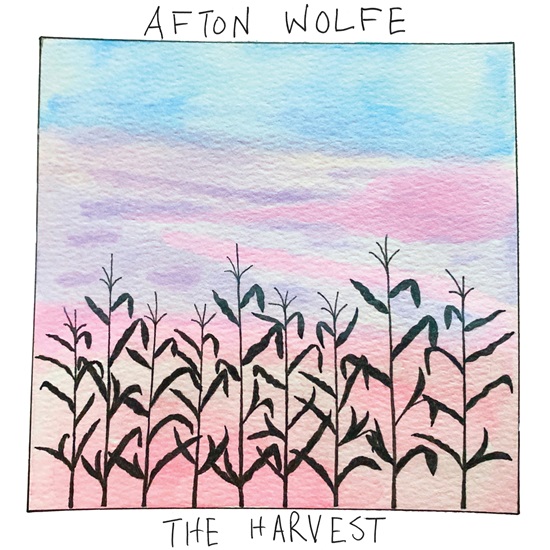
If anything’s predictable about the work of Afton Wolfe it’s the unpredictability. He has such a wide range of references and influences that you never know what’s around the next corner. The first surprise about ‘The Harvest’ is that there are no Afton Wolfe originals. The second surprise is that all of the songs are written by his father-in-law L.H. Halliburton so the album’s all about performance and interpretation of someone else’s songs, bringing all of his influences into play. Afton’s gravelly baritone serves all seven songs on this project perfectly the slightly sinister ‘Hello, Mr. Wolf’ – more about that later.
The album opens with ‘The Harvest’ which bounces along with hints of Van Morrison’s ‘Bright Side of the Road’ to put forward the idea that the year should begin in the fall with the harvest, rather than in spring with the sowing. ‘New Orleans Going Down’ has an unsurprising Dr John feel with the full band (including piano, of course). The vocal delivery echoes the rising of the flood water, becoming more impassioned with each chorus as the water levels become more dangerous. The next two songs get to the heart of Afton Wolfe; if you threw the DNA of Bob Seger and Tom Waits in a blender, you would get something close to Afton Wolfe vocally and stylistically.
The gospel-tinged ‘Lost Prayers’ with piano and fiddle fills evokes the classic mid-tempo Seger song, while ‘Hello, Mr. Wolf’ with its gruff spoken lyric and its off-kilter sparse arrangement and comparison of the wolf with human animals echoes Tom Waits at his most raw. The next two songs both look back in terms of style. ‘Till the River No Longer Flows’, with its message of persistence in the face of adversity has a big Southern rock sound in the good old Lynyrd Skynyrd style, including the obligatory extended guitar solo to the finish. ‘Mississippi’ has Afton exploring his soul/Stax roots with horns and piano triplets as he delivers L.H. Halliburton’s message to the state that mirrors Neil Young’s seventies message to Alabama. The album closes with the very lo-fi ‘Here to Stay’ exploring loneliness over a stuttering, reverbed piano backing saturated with tape hiss. It’s very evocative, bordering on disturbing.
‘The Harvest’ is an interesting project. Afton Wolfe doesn’t shy away from covers and interpretations, but covering seven songs by the same writer is a different challenge altogether and he absolutely aces it with his usual variety of styles and distinctive vocal delivery. Whatever Afton Wolfe tackles, you know it’s going to be interesting.
‘The Harvest’ is out now on Grandiflora Records.
Here’s the official video for ‘Lost Prayers’:
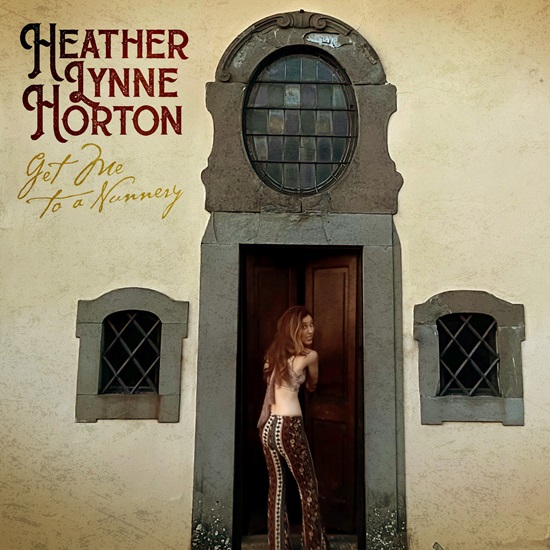
‘Get Me to a Nunnery’ is Heather Lynne Horton’s third album, following 2012’s ‘Postcard Saturdays’ and 2017’s ‘Don’t Mess with Mrs Murphy’. You might think that’s a fairly relaxed pace, but she has had other priorities, including raising her daughter and collaborating with her husband, Michael McDermott, on his solo and Westies albums. She’s even done a bit of touring with Michael as well. As you might expect, Michael features heavily on the album along with other collaborators like Will Kimbrough, although the concept, production and direction of the album are purely down to Heather.
There’s a theme running through the album which is strongly hinted at by the title. It’s the oppression of outsiders and minorities; the ones who don’t have the power to challenge when they’re told “That’s just the way it is”. There are some production and musical themes that run through the album as well. There’s an overall dreamy, ethereal feel that’s partly created by Heather’s layered lead and backing vocals that hint at sixties-era Marianne Faithfull, particularly on the album’s opening song.
‘After All This Time’ is slightly uncharacteristic in that underneath Heather’s vulnerable vocal the song builds up to a Spector-like wall of sound arrangement as it tells the story of a relationship that’s survived everything life can throw at it.
The two most vehemently anti-oppression songs on the album both feature Heather’s violin playing. ‘Ten Times’, with its lead vocals panned left and right deals with difficulties women find when the have to work ten times as hard as men to succeed and ‘Call a Spade a Spade’ with a sparse, almost sinister arrangement enhanced by the occasional single sour piano note as it highlights the racism that is still with us almost seventy years after Rosa Parks refused to give up her seat on the bus.
‘You Said So’ and ‘Take Off’ both have an autobiographical flavour, with the latter metaphorically linking air travel with a career in the music business highlighting the conflict between family and professional life; you can’t give one hundred per cent to both. The album’s final piece, ‘Lin’s Never-Ending Song’ is a condensed classical string quartet, hinting at Bach, with several movements and various tempi and techniques, including a pizzicato passage and lots of counterpoint that demonstrate Heather’s violin and arrangement virtuosity. It’s a lovely way to finish the album.
The dreamy soundscapes of ‘Get Me to a Nunnery’ create a seductive and subversive framework to soften you up before Heather delivers the subtle lyrical punches. The album was inspired by and is dedicated to Sinead O’Connor, who died just as the recording was completed; it’s a fitting tribute.
‘Get Me to a Nunnery’ is out now on Pauper Sky Records (PSR015).
Here’s the video for ‘After All This Time’:
As an added bonus, here’s a shot of Heather from her UK tour with Michael McDermott in 2017:

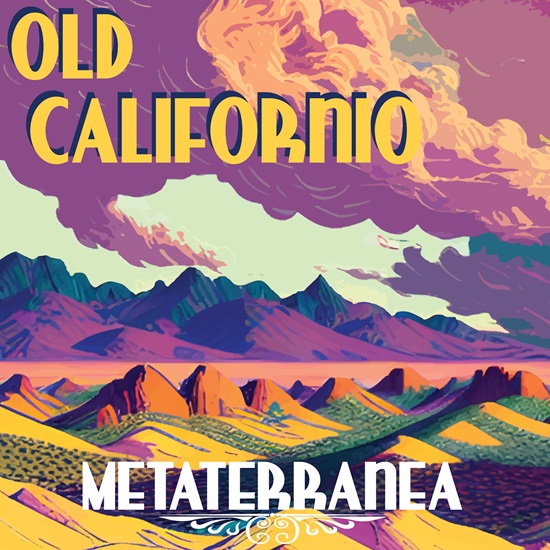
The longer you listen to ‘Metaterranea’ the more you realise what a challenge it is to pin down Old Californio to any given style. There are elements of country, elements of straight-ahead rock and even a bit of jazz thrown in. What you can be certain of is that the songs are well-crafted and the playing is superb throughout. The choice of songs to top and tail the album shines a light on the band’s influences and the musical journey taken by the ten songs.
The album opens with a tribute to El Camino Real (definitely not the King’s Road in Chelsea) and the people who gather in the bars in the towns along the old highway. It’s a song that harks back to the analogue and organic era of the seventies (there’s even a lyrical reference to “The lotus eaters and the luddites”) and great bar bands with musicians playing guitars, keys, drums and bass as opposed to sequencers, loop stations and laptops. Like the rest of the album it’s more about the feel than the technical aspects.
The album takes us on a journey, through all of its twists and turns to the final song ‘Just Like a Cloud’ which is a lyrical and musical exploration of dissolution. Lyrically it’s all about the thought of returning to the ecosphere after death, while musically it starts as a solid rock arrangement with guitar and electric piano before an extended guitar solo morphs away from rock territory into atonal freeform jazz to represent the random scattering of fragmented remains.
The name Old Californio is entirely accurate. Songwriter Rich Dembowski is an old-school melancholy West Coast troubadour with dreamlike songscapes and lyrical references to evanescence, mythology (Sisyphus) and even Holy Communion. The musical settings also reflect the late sixties/early seventies vibe with hints of The Band and the rockier Neil Young material. It’s loose but with a nice swing. If there’s one song that encapsulates the outsider status of Rich Dembowski, it’s ‘Weeds/Wildflowers’, which sees the outsider as the weed. As gardeners will tell you most weeds are just plants that grow where you don’t want them.
‘Metaterranea’ is very much a back-to-basics album where the focus is on creating settings that emphasise the message of the original and unusual songs without any unnecessary studio trickery – just great arrangements and great playing. I’ll take that any day of the week.
Here’s the album’s opener, ‘Old Kings Road’:
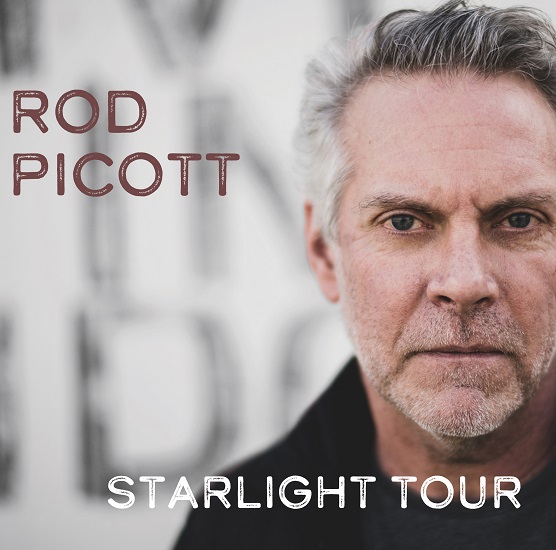
Rod Picott’s a craftsman, working on songs in the same way as carpenter works with wood and a mason works with stone. When he talks about the songs in his notes on the album, he uses images of chisels and carving knives to illustrate the process of knocking a song into shape. If there’s a better songwriting chronicler of rust-belt blue-collar America than Rod Picott, I haven’t heard them; he’s totally authentic and he incorporates his own experiences into his work. By his own admission he’s finding it more difficult to create songs these days after ten albums but he’s now working with other songwriters to create classic songs; the magic is still most definitely there and ‘Starlight Tour’ is probably the most complete Rod Picott album I’ve heard.
The discipline required to complete the album in just five studio days with producer Neilson Hubbard is evident in the arrangement for all ten songs, whether it’s the full-band sound of the blue-collar anthem ‘Digging Ditches’ and moody nostalgic rock of ‘Wasteland’ or the two stripped-back songs that close the album, ‘Pelican Bay’ telling the story of Vietnam veteran and his happiness followed by tragedy and the intimations of mortality in the closing song ‘It’s Time to Let Go of Your Dreams’ with a close-mic vocal backed by acoustic guitar and a very understated muted trumpet solo.
There are references you come to expect on a Rod Picott album; boxing’s one of them. His take on the tragic life of Sonny Liston from 2022’s ‘Paper Hearts and Broken Arrows’ is a classic. Here he builds ‘A Puncher’s Chance’ around a boxing metaphor which he applies to a romantic pursuit; the last thing to go is a boxer’s strength, so there’s always a chance of landing a lucky punch if you’re willing to take enough punishment along the way.
Rod’s songs are firmly grounded in real life; his style is very much audio verité and two of the co-writes demonstrate this in different ways. ‘Homecoming Queen’, written with Amy Speace, tells a familiar story with a more personal twist, while the Nick Nace co-write is an exploration of tales of the Saskatoon Police dumping drunk indigenous people outside the city in winter to die of hypothermia. There’s a terrible economy and clarity in the line “His crime was being, drunk, brown and poor” set against the sparse arrangement of ‘Starlight Tour’ that stops you in your tracks.
If you’ve heard any of Rod’s previous work, you’ll recognise some of the themes here; his interest in boxing, looking through the rear-view at small-town America and his love of its inhabitants. The change in tone with ‘Starlight Tour’ and, to a certain extent, its predecessor ‘Paper Hearts and Broken Arrows’ is that they‘re looking forwards at a road that’s much shorter than the road already travelled. It’s a difficult realisation to come to terms with and it adds a maturity to the album that promotes it from great Rod Picott album to classic singer-songwriter album.
‘Starlight Tour’ is released in the UK on Friday October 20th on Welding Rod Records.
Here’s the lyric video from the album’s opening song, ‘Next Man in Line’:
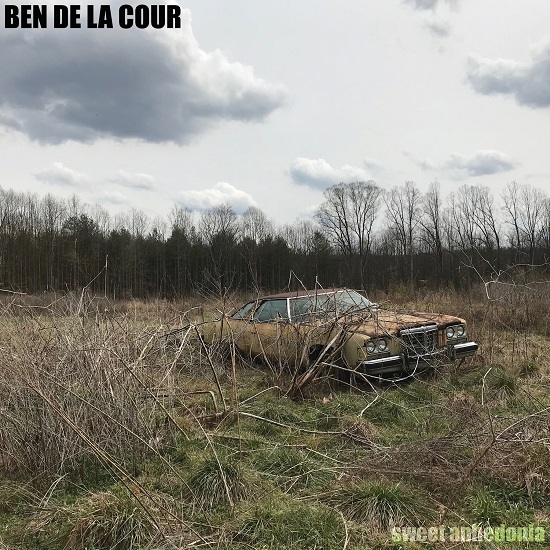
Usually the most difficult thing about reviewing music is working out where to start. Ben de la Cour solves that problem by giving the title song of his new album an enigmatic and intriguing title of ‘Sweet Anhedonia’. I had to look it up, and, logically enough, it comes from the same Ancient Greek root as hedonism and it means the inability to feel pleasure; it’s usually associated with illnesses such as depression. Maybe it’s just a coincidence, but there may be a reference to the 1996 Catatonia single, ‘Sweet Catatonia’. The title song, ‘Sweet Anhedonia’, is a melancholy exploration of this condition with a haunting triple time arrangement enhanced by delicate backing vocals and pedal steel.
There’s a lot more to Ben de la Cour than melancholy. There’s some wordplay in the song titles ‘Appalachian Book of the Dead’ and ‘Suicide of Town’, there are a couple of co-writes with very interesting songwriters, some great stories and some interesting arrangements. One of the co-writes, ‘Numbers Game’, was written with the gifted Canadian singer-songwriter Lynne Hanson and deals with the loading of life’s dice in favour of the privileged, set against a backdrop of finger-picked acoustic guitars, fiddle, pedal steel and Laurel Canyon harmonies.
Don’t run away with the idea that ‘Sweet Anhedonia’ is just a bunch of sad songs. The riff-driven ‘Suicide of Town’ is pure FM drivetime with a vocal that hints at Tom Petty and Rob Thomas and guitars playing off against each other, while ‘Shine on the Highway’ combines two electric guitars with fiddle and trumpet to create a song that would feel at home on a Greg Dulli solo album. And talking of influences, ‘American Mind’ hints at Jackson Browne’s apocalyptic feel from ‘Before the Deluge’, with the addition of Vietnam references and martial drumbeat (which is also a common theme throughout the album) for emphasis.
‘Palookaville’ features a series of characters that would fit in perfectly on any of the first three Springsteen album and uses Buddy Holly as an example of an artist whose legacy is untainted because he wasn’t around long enough to go downhill and either hit the skids or end up playing residencies in Vegas.
‘Sweet Anhedonia’ is a lyrically thought-provoking set of songs set against diverse musical backgrounds and textures, incorporating influences from Americana, folk, rock, pop and a whole lot more, skilfully blended to create a work that is entirely Ben de la Cour.
‘Sweet Anhedonia’ is released in the UK on Jullian Records (JR32CD/LP) on Friday October 13th.
Here’s the video for ‘Shine on the Highway’:
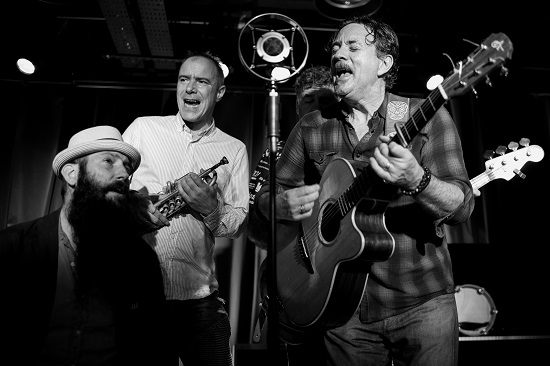
Whether you listen to one of their albums or you go to see Track Dogs live, there’s one thing you can guarantee; it won’t be predictable. The mix of musical influences brought to the band by Garrett Wall, Robbie K Jones, Howard Brown and Dave Mooney, in addition to the influences of their adopted hometown of Madrid, ensures that you won’t know what’s coming next. The title ‘Blind Summits & Hidden Dips’ sums it up perfectly as a metaphor for life in general and the album in particular. You can make the journey from Laurel Canyon to twelve-bar blues (with a twist) from one song to the next.
The rapid changes of direction and style flow naturally from a band with such a range of vocal and instrumental skills and diverse influences as the album’s first three songs demonstrate. The opener, ‘The Way of Things’, has a very Latin feel with trumpets that edge over into Gibson Brothers territory and even a Spanish vocal. It’s followed by ‘Cover Your Tracks’ which channels the seventies West Coast vibe with acoustic guitar and vibes and the customary smooth harmonies. The album’s third song, the slightly bawdy ‘Be Your Silver Bullet’, opens with Garrett Wall intoning the roll-call from the 1967 children’s series Trumpton before breaking in to a banjo and horns-driven I-IV-V blues progression. In true Track Dogs style, it’s anything but standard; there’s a guest appearance from sax legend Lou Marini and the song builds to a New Orleans jazz ending. As ever the harmonies are superb.
The album features a couple of covers, a fairly straightforward rendition of Lester Flatt’s ‘Sleep With One Eye Open’ and a Latin take on a song written by an American (Stevie Nicks) about a Welsh witch, with a guest vocal from Spanish singer Lu Garnet. ‘Rhiannon’ is very different from the Fleetwood Mac original with its ukulele, bass trumpet and vibes arrangement. To emphasise the album’s unpredictability, ‘Strange Days’ is a positive message about coming out of lockdown set against a reggae backbeat while ‘Disaster at Sea’ is a spoof sea shanty with a whimsical lyrical twist at the end. ‘Blind Summits & Hidden Dips’ is packed with inventiveness and surprises around every hairpin bend; you won’t get bored with this anytime soon.
‘Blind Summits & Hidden Dips’ is released on Friday October 6th in the UK on Mondegreen Records (MGR1023).
Here’s the video for ‘Cover Your Tracks’:
The best way to enjoy the full Track Dogs experience is to see them live so here’s a link to their upcoming UK tour dates.
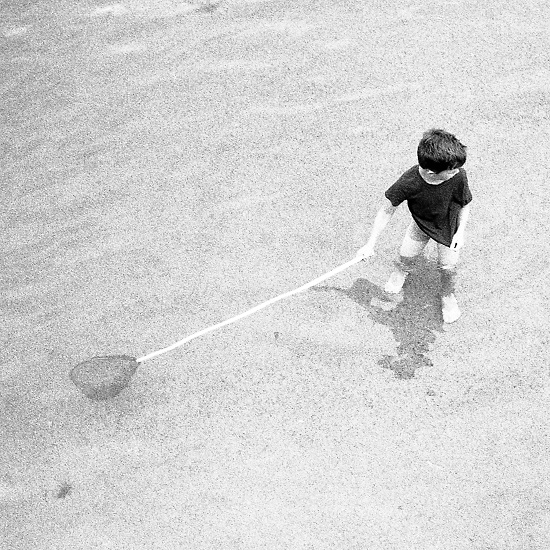
How many songs by Scottish bands feature the word “rain”? ‘Raintown’, ‘Tinseltown in the Rain’, ‘Why Does it Always Rain on Me?’, and that’s before we even get to Dean Owens’ brilliant ‘Raining in Glasgow’ and all the rest. There’s a reason for that, of course, the same reason why ‘The Flood’ opens with the song ‘Edinburgh Rain’. The message isn’t always negative; rain has the power to clear the air and “Wash my blues away”.
Wayward Jane (Dan Abrahams, Sam Gillespie, Rachel Petyt and Michael Starkey) is an interesting idea, combining the basic elements of an Appalachian string band with some traditional Scottish folk influences. The end result is an original sound that’s somewhere between a string band , folk troubadour and ceilidh band mixing the influences subtly to create a sound that’s best described by the title of one of the instrumentals, ‘Doucement’ which translates as gently or softly. Wayward Jane take some of the harder edges away from the string band and soften them with Sam Gillespie’s wooden flute playing and laid-back performances.
The album’s a mixture of songs and instrumentals, mainly originals, but with the addition of a couple of reworkings, one the traditional song ‘Little Satchel’ and the other a fairly traditional string band version with lovely four-part harmonies of ‘Shake Sugaree’, the Elizabeth Cotten song that’s becoming an Americana standard.
To come back to that rain, the album has a watery theme running through it, including the banjo and fiddle-led ‘Didn’t It Rain’, telling the all-too-familiar story of catastrophic weather events in the Southern states. There are also three pieces back-to-back in the middle of the album with aquatic themes; ‘Crossing Over Water’ begins with two guitars and builds with fiddle and banjo to four-part instrumental harmony before Rachel Petyt comes in with a very traditional folk vocal, ‘The Flood’ is a typical string band instrumental giving all the players a chance to demonstrate their skills and ‘Down by the River’ has a country feel with unison banjo and fiddle and lovely harmonies.
What makes ‘The Flood’ so original is the varying textures created by the playing and the range of vocal styles. The instruments are used in every possible combination (particularly with the addition of wooden flute) to make each piece distinctive. It’s a lovely album with pleasant surprises wherever you turn.
‘The Flood’ is out now on ‘Down The River Records’ (WJ003) and you can still see the band at these tour dates.
Here’s the video of ‘Crossing Over Water’:


